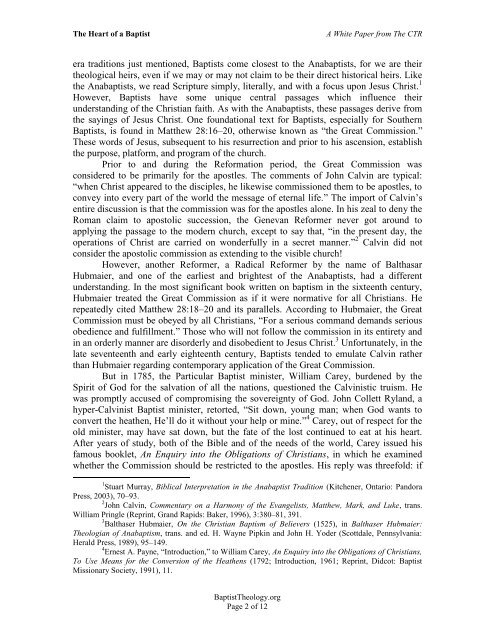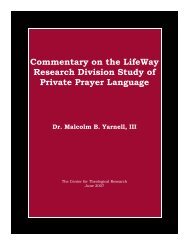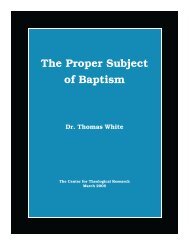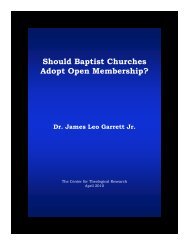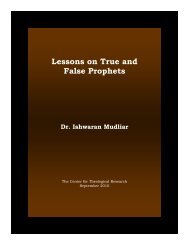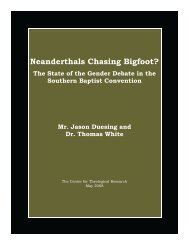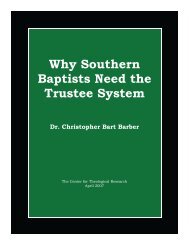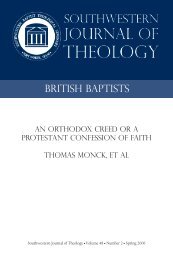The Heart of a Baptist - Baptist Theology
The Heart of a Baptist - Baptist Theology
The Heart of a Baptist - Baptist Theology
You also want an ePaper? Increase the reach of your titles
YUMPU automatically turns print PDFs into web optimized ePapers that Google loves.
<strong>The</strong> <strong>Heart</strong> <strong>of</strong> a <strong>Baptist</strong>A White Paper from <strong>The</strong> CTRera traditions just mentioned, <strong>Baptist</strong>s come closest to the Anabaptists, for we are theirtheological heirs, even if we may or may not claim to be their direct historical heirs. Likethe Anabaptists, we read Scripture simply, literally, and with a focus upon Jesus Christ. 1However, <strong>Baptist</strong>s have some unique central passages which influence theirunderstanding <strong>of</strong> the Christian faith. As with the Anabaptists, these passages derive fromthe sayings <strong>of</strong> Jesus Christ. One foundational text for <strong>Baptist</strong>s, especially for Southern<strong>Baptist</strong>s, is found in Matthew 28:16–20, otherwise known as ―the Great Commission.‖<strong>The</strong>se words <strong>of</strong> Jesus, subsequent to his resurrection and prior to his ascension, establishthe purpose, platform, and program <strong>of</strong> the church.Prior to and during the Reformation period, the Great Commission wasconsidered to be primarily for the apostles. <strong>The</strong> comments <strong>of</strong> John Calvin are typical:―when Christ appeared to the disciples, he likewise commissioned them to be apostles, toconvey into every part <strong>of</strong> the world the message <strong>of</strong> eternal life.‖ <strong>The</strong> import <strong>of</strong> Calvin‘sentire discussion is that the commission was for the apostles alone. In his zeal to deny theRoman claim to apostolic succession, the Genevan Reformer never got around toapplying the passage to the modern church, except to say that, ―in the present day, theoperations <strong>of</strong> Christ are carried on wonderfully in a secret manner.‖ 2 Calvin did notconsider the apostolic commission as extending to the visible church!However, another Reformer, a Radical Reformer by the name <strong>of</strong> BalthasarHubmaier, and one <strong>of</strong> the earliest and brightest <strong>of</strong> the Anabaptists, had a differentunderstanding. In the most significant book written on baptism in the sixteenth century,Hubmaier treated the Great Commission as if it were normative for all Christians. Herepeatedly cited Matthew 28:18–20 and its parallels. According to Hubmaier, the GreatCommission must be obeyed by all Christians, ―For a serious command demands seriousobedience and fulfillment.‖ Those who will not follow the commission in its entirety andin an orderly manner are disorderly and disobedient to Jesus Christ. 3 Unfortunately, in thelate seventeenth and early eighteenth century, <strong>Baptist</strong>s tended to emulate Calvin ratherthan Hubmaier regarding contemporary application <strong>of</strong> the Great Commission.But in 1785, the Particular <strong>Baptist</strong> minister, William Carey, burdened by theSpirit <strong>of</strong> God for the salvation <strong>of</strong> all the nations, questioned the Calvinistic truism. Hewas promptly accused <strong>of</strong> compromising the sovereignty <strong>of</strong> God. John Collett Ryland, ahyper-Calvinist <strong>Baptist</strong> minister, retorted, ―Sit down, young man; when God wants toconvert the heathen, He‘ll do it without your help or mine.‖ 4 Carey, out <strong>of</strong> respect for theold minister, may have sat down, but the fate <strong>of</strong> the lost continued to eat at his heart.After years <strong>of</strong> study, both <strong>of</strong> the Bible and <strong>of</strong> the needs <strong>of</strong> the world, Carey issued hisfamous booklet, An Enquiry into the Obligations <strong>of</strong> Christians, in which he examinedwhether the Commission should be restricted to the apostles. His reply was threefold: if1 Stuart Murray, Biblical Interpretation in the Anabaptist Tradition (Kitchener, Ontario: PandoraPress, 2003), 70–93.2 John Calvin, Commentary on a Harmony <strong>of</strong> the Evangelists, Matthew, Mark, and Luke, trans.William Pringle (Reprint, Grand Rapids: Baker, 1996), 3:380–81, 391.3 Balthaser Hubmaier, On the Christian Baptism <strong>of</strong> Believers (1525), in Balthaser Hubmaier:<strong>The</strong>ologian <strong>of</strong> Anabaptism, trans. and ed. H. Wayne Pipkin and John H. Yoder (Scottdale, Pennsylvania:Herald Press, 1989), 95–149.4 Ernest A. Payne, ―Introduction,‖ to William Carey, An Enquiry into the Obligations <strong>of</strong> Christians,To Use Means for the Conversion <strong>of</strong> the Heathens (1792; Introduction, 1961; Reprint, Didcot: <strong>Baptist</strong>Missionary Society, 1991), 11.<strong>Baptist</strong><strong>The</strong>ology.orgPage 2 <strong>of</strong> 12


